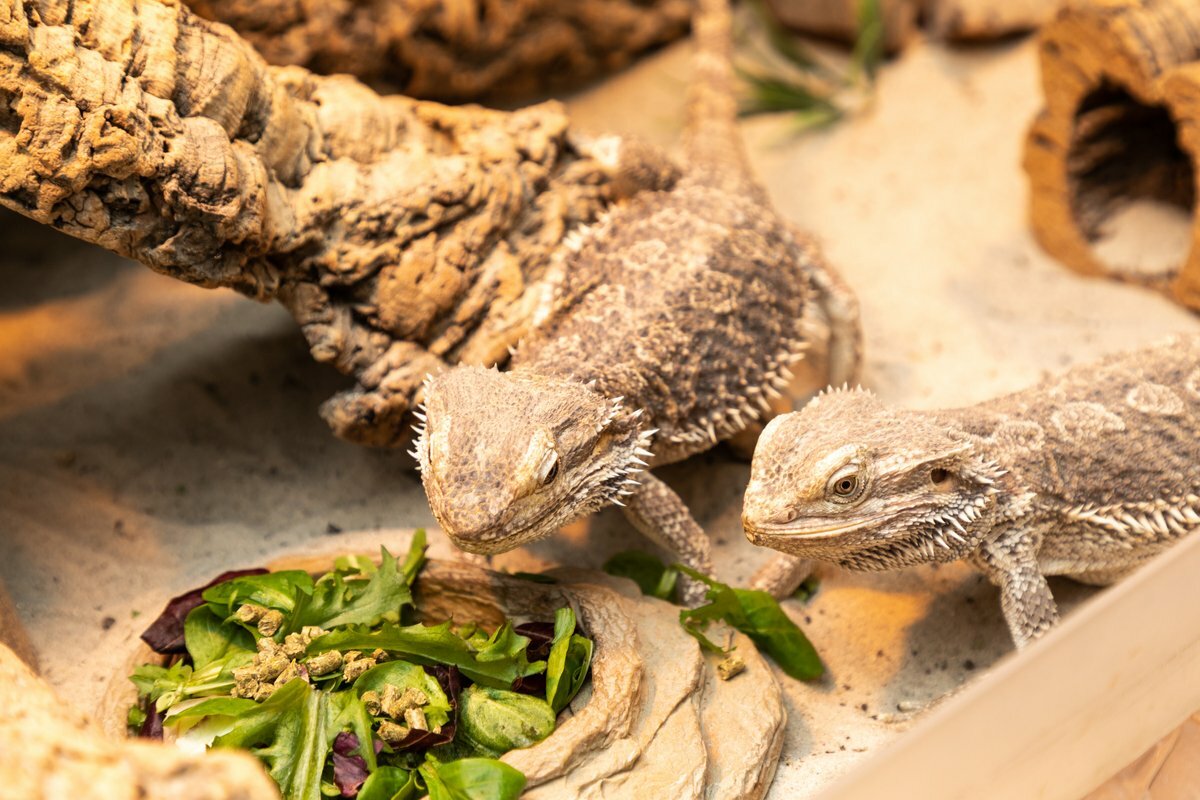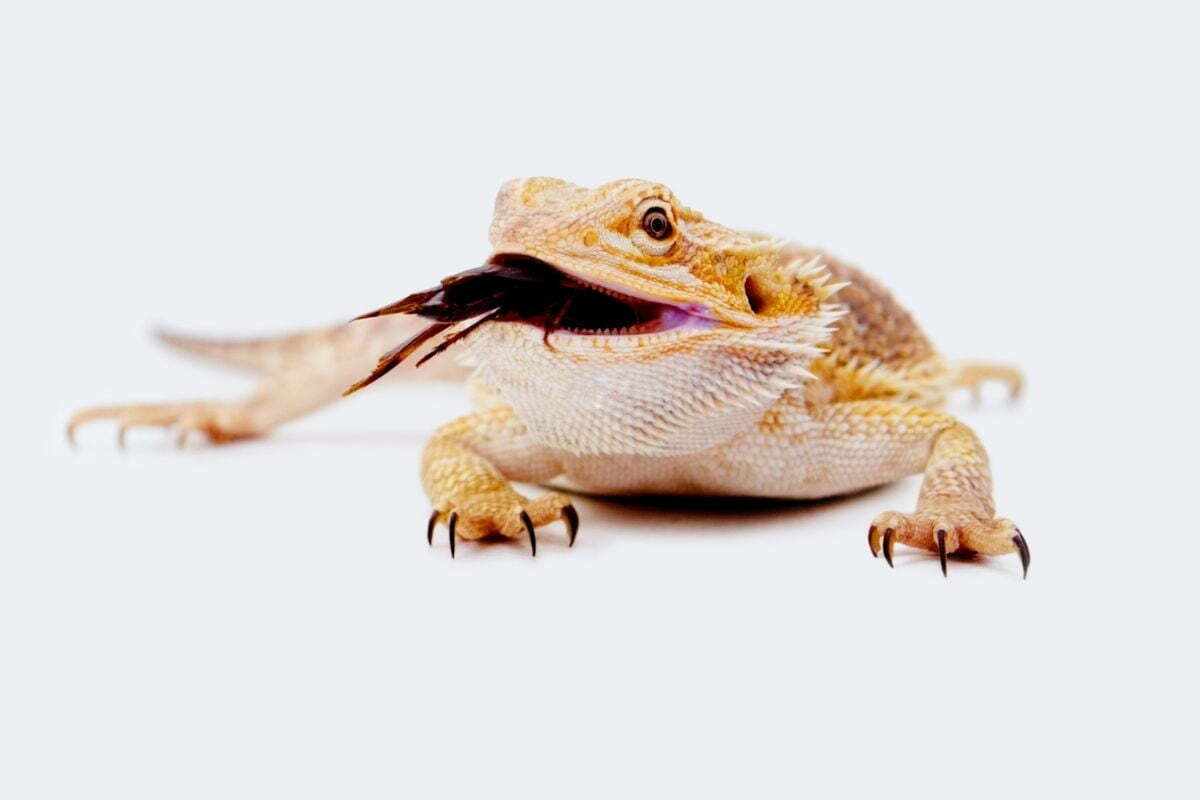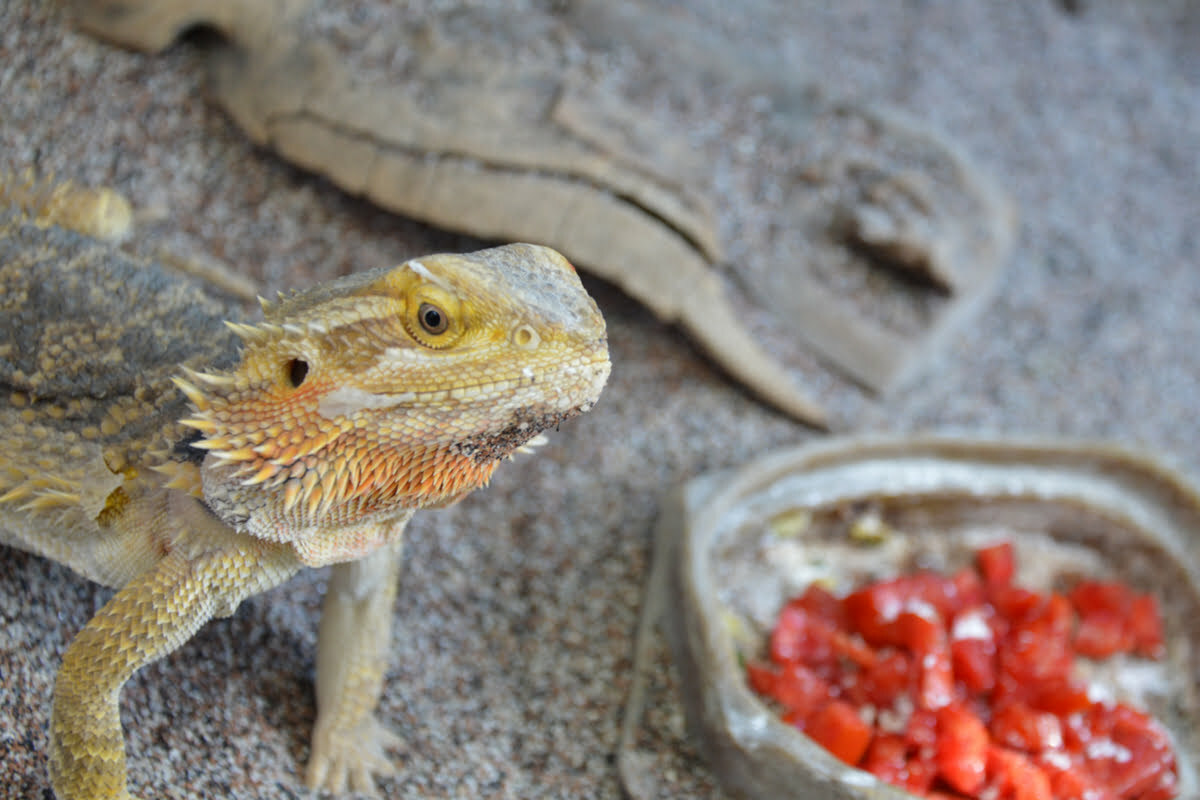Getting a new pet involves a lot of preparation and research. This article will help you understand what to feed a Bearded Dragon.

You have to set up a nice little habitat for them, make sure there is plenty of enrichment, buy all the things you need to keep them clean and find out what they can and cannot eat.
Not doing your research first when it comes to your pet’s diet can lead to disastrous results. Many animals are allergic to different things, and an unprepared owner can risk their pet’s health and life by making assumptions about what foods they can and cannot eat.
The same goes for Bearded Dragons – they are cool, easy to maintain, and look after a lizard which makes them a popular choice for exotic pets, but many owners go in unprepared and often end up poisoning their poor Bearded Dragons.
So, if you want to find out what foods you can give to your Bearded Dragon and what you should avoid giving them at all costs, then this is the place for you.
We will be taking a closer look at the diet of a Bearded Dragon so you can give your new pet the best possible care you can.
So, let’s get started!
An Overview Of The Bearded Dragon Diet
Bearded Dragons are omnivores which means they can eat a range of foods, including meats and insects, vegetables and greens, and also fruit – but this does not mean you can feed your Bearded Dragon any vegetable or fruit, or insect.
Bearded Dragons may be omnivores, but they do have a restrictive diet which means there are many things that will make them seriously ill, and it only takes one mistake by the owner to put your Bearded Dragon’s life at risk.
In captivity, a Bearded Dragon’s diet should reflect what they mainly eat out in the wild.
The main meal of a wild Bearded Dragon is some insect or small animal, including crickets, worms, cockroaches, and mice. In fact, these kinds of animals make up whole three-quarters of a Bearded Dragon’s diet.
But Bearded Dragons do not live on just meat alone. They like a bit of variety in their diet, and they can also eat a few certain kinds of fruit, vegetables, and greens. These make up the final quarter of the Bearded Dragon’s diet, but they cannot live on just greens alone.
The key to a happy Bearded Dragon is a balanced diet, and you should aim to keep this 75% meat to 25% plant diet for your captive Bearded Dragon.
Trying to make your Bearded Dragon a vegan or completely carnivore can lead to other diet-related health problems, such as obesity or a lack of nutrition.
Older Bearded Dragons are recommended to eat more greens and plants than younger Bearded Dragons. This is because younger Bearded Dragons need the nutrition and energy to grow healthily, while older Bearded Dragons need less meat as they won’t be as active as they were in their youth.
As a result, older Bearded Dragons require less energy, and thus, their diet can be made up of more plants than it was when they were young.
However, the terms ‘plants’ and ‘meat’, and ‘fruit’ are very vague – let’s check out what specifically you can give your Bearded Dragon and what foods will potentially be fatal to them!
What Meat Can A Bearded Dragon Eat?

Meat makes up most of a Bearded Dragon’s diet, so it’s important that you feed them a lot of it and also the right kinds.
In the wild, Bearded Dragons mostly eat crickets, cockroaches, and worms, so these are the go-to foods for feeding your Bearded Dragons.
They can easily be purchased online or from pet stores, and you should always feed your Bearded Dragons specifically bred insects instead of wild ones you have caught yourself.
Wild insects can carry parasites and diseases that could harm or kill your Bearded Dragon so keep to store-bought insects that are definitely healthy and perfect for your Bearded Dragon’s diet.
Worms are also interesting because there are so many types – Earthworms, Butterworms, Silkworms, Phoenix worms, Waxworms, and the list goes on! However, these should be kept more as the odd treat because worms are very fattening.
Waxworms, in particular, should not be fed as a meal but instead as a rare treat because they are so fatty, and feeding them regularly to your Bearded Dragon could be bad for its health.
However, they are harmless as an odd treat (just like how we humans like to eat candy as a treat but we wouldn’t eat it for dinner).
There are also certain insects you should avoid feeding your Bearded Dragon because they could potentially be harmful and deadly to them.
Venomous creatures like scorpions and spiders are a definite no-go, as well as other insects like wasps, bees, ladybugs, and flies. Store-bought meat is also a definite no, as well as any kind of fish.
Feeding your Bearded Dragon any of these foods could cause them to become seriously ill, while other fatty meats can give your Bearded Dragon too much of the wrong stuff.
So, for a happy, healthy Bearded Dragon, make sure that their diet consists mostly of insects like crickets and cockroaches, with maybe the off Wax worm as a treat!
What Vegetables Can A Bearded Dragon Eat?
Bearded Dragons have a super diverse diet which makes it easy to feed them the scraps of vegetables you won’t finish off yourself – however, if you give them the wrong thing, then you are instead giving them a one-way ticket to discomfort and illness.
To avoid this, ensure that you only give a Bearded Dragon some of the vegetables we are about to go into.
Vegetables like peas, butternut squash, broccoli, okra, bell pepper, and green beans are all safe for a Bearded Dragon to eat. You can also feed them cabbage, parsnip, asparagus, and yellow squash.
If you have a few small portions of these vegetables that you don’t want to go to waste, you can break them up into very small pieces and pop them into your Bearded Dragon’s home.
It’s important to remember that Bearded Dragons cannot live on vegetables alone. They should only be fed vegetables in very small quantities to bring some variety to their diet and help reduce their fat intake as they grow older.
However, not every single vegetable is fine for your Bearded Dragon to eat. You should avoid vegetables that can cause calcium deficiency and are very acidic, like onions or garlic.
These can cause your Bearded Dragon to become very sick and seriously impact their health.
The same goes for mushrooms and chives – make sure that your Bearded Dragon never gets too much of them otherwise, they will have a seriously upset stomach later.
Anything that is just mostly water, like Iceberg lettuce or celery, is also not great for your Bearded Dragon due to their low nutritional value.
Bearded Dragons do not require much feeding, and foods like these will take up space in their stomachs when they need something of nutritional value.
So, make sure that the vegetables that you give your Bearded Dragons contain the right stuff, and they will be satisfied with what you give them.
What Fruit Can A Bearded Dragon Eat?

Fruit is a tricky one because there are only a few select fruits that Bearded Dragons can eat. While you may have seen cute little images online of Bearded Dragons munching on all kinds of fruit, many of them will make your Bearded Dragon seriously ill due to their acidity or toxicity.
A few of these kinds of fruit include oranges and lemons. These are really bad for Bearded Dragons because they are citrus fruits and can seriously give them an upset stomach. In fact, avoid all citrus fruits, including grapefruit, limes, pomelos, and tangerines.
Avocado is also a fruit that you should definitely avoid giving to Bearded Dragons. They contain many toxic chemicals to reptiles, and just a small amount is enough to seriously make a Bearded Dragon ill – a big portion will definitely kill them.
The same goes for rhubarb. Rhubarb contains oxalic acid, which is poisonous to Bearded Dragons. Giving your Bearded Dragon a small portion of rhubarb is just enough to kill them – don’t do it.
Instead, feed your Bearded Dragon fruits like watermelon, apple, mango, peaches, and papaya. These are great for the odd treat but should not be fed as part of your Bearded Dragon’s daily diet.
This is because most fruits are very high in sugar, which can lead to obesity and related health problems.
So, you can give your Bearded Dragon a slice of apple occasionally but do not make it a part of their daily diet unless you want to overfeed them and lead them towards some serious health concerns.
Also, ensure all fruit is peeled, and the pips have been removed beforehand to prevent your Bearded Dragon from choking on their fruity snack.
What Greens Can A Bearded Dragon Eat?
And finally, we come down to the greens.
Like with vegetables, you should avoid giving your Bearded Dragon any greens that cause calcium deficiency. The biggest offender for this is spinach, so it’s best to avoid it, although some guides may say that spinach is fine for Bearded Dragons.
While it’s true that it won’t kill a Bearded Dragon instantly, including it in your Bearded Dragon’s daily diet will eventually lead to metabolic bone disease and potentially other related problems, so we recommend you skip it entirely.
Instead, you can feed your Bearded Dragon greens like clover, parsley, dandelion greens, kale, and floret mix. Wash them with clean water and cut them down to tiny bite-size pieces before offering them up to your Bearded Dragon, and you are golden.
They are sure to love them and munch on them happily but remember that they should only make up around a quarter of your older Bearded Dragon’s diet. This is to fill their belly, but it won’t give them so much energy that they become obese in their old age.
Conclusion
Overall, Bearded Dragons have a pretty diverse diet, but many owners think that they can feed their Bearded Dragon anything.
That is not true, as some foods like fireflies, avocados, rhubarb, and spinach can seriously damage your Bearded Dragon’s health.
Remember to stick to the 75% meat to 25% plant rule, keep fatty and sugary foods like fruit and worms to a minimum, and never feed your Bearded Dragon wildly caught meats that could potentially be carrying parasites and disease.
Follow the guidelines above and avoid the foods stated, and your Bearded Dragon will be able to enjoy a diverse diet full of all the good things that they can enjoy.
Not only that, but this also means that you, too, can enjoy your faithful companion’s company for many years.
